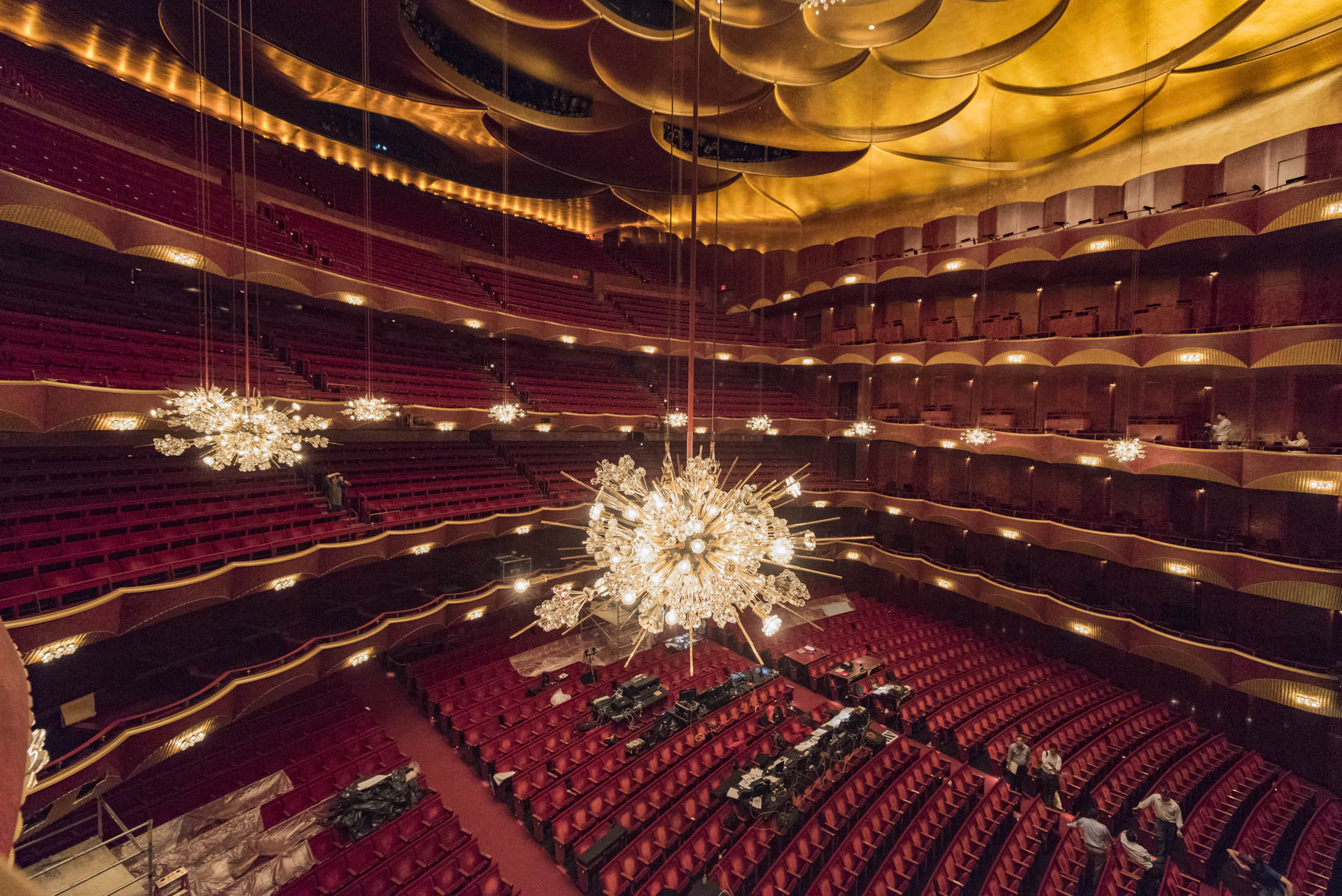Finally, Peter Gelb spins his Met massacre to the tame Times
mainTwenty-four hours after sacking 50 staff, Gelb tries to play down the bloodshed in the passive parish sheet, here.
Gelb claims ‘only’ 21 of 243 admin staff are affected. Our informants insist the number is 50.
None of the victims has spoken yet, fearing loss of their severance and pensions.
Look at it any way you like, this is no way to start an opera season. Or to inspire confidence in the Met.






Even with the ‘spin’ in the article, there is a major bombshell that the NYTimes is basically glossing over- the Met is trying to reduce its budget by $14,000,000 this season. That is a very big number, and they’re basically admitting that they won’t even get to that with these staff cuts.
Bears repeating: The situation is far worse than acknowledged, what with the disappearance of stars, vocal stars at that, of important voices and artists. The elephant in the room.
P.S.: The Met’s current Norma, one Sondra Radvanovsky, recently gave a recital in LA that, as viewed and heard on YouTube (since taken down), was an abject embarrassment and the embodiment of everything that is wrong with singing today. She communicated ZERO and could have been reading the telephone book for all I know. Or care. But don’t tell Tommasini.
Needless to say, the burden of the disappearance of important artists and voices does not rest on Gelb’s shoulders. Little to nothing the man can do about the epidemic.
The artists are out there they simply refuse to work with Peter Gelb. Big stars like Jonas Kaufman don’t need to be treated like a widget on a conveyor belt, with budget cutting to rehearsals and artists compensation ( along with everyone else in the company except Mr. Gelb who continues to make over 2 MILLION dollars salary at a not -for – profit no less).
The Metropolitan Opera house was once an exciting , interesting theater when Joe Volpe was GM and James Levine was conducting regularly ( and in good health).
The curtain would go up and we knew we would see and hear glorious music and powerful singing and be treated to opulent intricate sets in which the characters on stage each had a personality ! The Zeffirellis/ Otto Schenk / Nat Merrill etc .
Everything was worth seeing at least once and often over and over . Now we see big black or white boxes as sets filled with a blank looking chorus as wall paper. And that ghastly Ring Cycle . Dull
Dull dull . Of course we aren’t interested in going to the opera anymore . It is time for an entirely new administration in every area of the MetOpera .
Singers like Kaufmann are one of the biggest problems in modern opera.
There is *plenty* he could have been doing over this decade of decay.
And don’t dump on la Radvan. It’s not her fault.
Oops, correction: Not in LA but in Philly. It was dismal. No wonder the video was pulled down.
For those of us who grew up with the MET broadcasts sponsored by Texaco, these are indeed sad times. It’s an American institution that, like so many other things, is withering away in the digital download age. Movie theaters have had a terrible year, attendance and viewing of NFL is way down, even before the current uproar over the National Anthem. TV viewing for the major networks is down as more people go to internet based TV. The live arts – ballet, symphony, opera, theatre – are going to struggle more and more. Why should the MET be immune? Those of us who value – and support – opera and classical music are a small minority in the US and as the grim reaper keeps working overtime, that group will get smaller. The Met will have to adjust its budget accordingly unless some hi-tech billionaire decides he likes opera (fat chance).
Exactly. And at the risk of sounding like a broken record (a phrase
which many will not understand in 2017), younger generations can go though life with virtually no exposure to classical music or opera in any shape or form. Nothing in (most) schools, no features in TV news, no guest appearances on TV, which they don’t watch anyway. They will, perhaps, pick up the odd reference to a classical concert or an opera in a movie where it will probably be sneeringly regarded as something to avoid or fall asleep in.
No easy answer to this.
The Times article refers to 21 people being offered early retirement packages. It doesn’t mention other possible general layoffs
The Times (which learned of this story from Slipped Disc) does not challenge Gelb on a single statement.
Ungeheuer is correct. You cannot lay this crisis at Peter Gelb’s Door.
This is a crisis in teaching, a failure of the system to train and develop artists – and at its root lies the abandonment of the classical Italian techniques.
That small ridiculed, marginalised group that has struggled to maintain the presence of Italian technique should be brought front and centre to try the mend this crisis – because singers can retrain, we can have great opera back; but it means acknowledging the mistakes that have been made and taking a firm decision to move forward.
Of course the crisis lies at Peter Gelb’s door! Great voices, though of major importance, do not in themselves a great opera performance make, certainly not these days. What is key is the vital importance of selecting the best singers for particular roles and then teaming them with some of the finest opera conductors and stage directors. Since Peter Gelb has been the self-appointed Artistc Director of the Met in addition to his many other duties, he has with few exceptions shown himself to be vastly incapable of a role that it has for years been patently obvious he is singularly unqualified to fill! And yet, as others have pointed out, he is the Board’s lapdog and unless and until that Board take their responsibilities seriously and diligently, matters will only get worse.
The Warsaw Opera Kameralna has just had to reduce its 90 or so contracted solo singers, three orchestras, conductors et al…in all some 420 performers, to a rational number. Given that the theatre has seating for only 120 people, this is understandable. Its odd that this theatre is not better known.
I see little difference between the ‘crisis’ at the Met and other houses in Europe other than it is twice the size of the other leading companies but still shares the same core of repertory, singers, conductors and producers. More knowledgeable commentators will be able to address the decline compared to the past but for myself it seems that whatever the house or production the response is nowadays more likely to be polite applause for a passable performance than loud bravos for a totally thrilling one.
Gelb has tried to enliven the production values but has singularly failed to carry the subscribers with him and it appears that now McVicar is the new house Zeffirelli, but on a tighter budget, a salutory reminder of his dilemma. However the style of front line houses is now very much the same whichever continent you are on as are the available singers so it is left to mainly German houses to inject the dreaded Regie into the mix, which even after so many years proves hard to take for much if the audience outside Berlin/Munich.
The reality for Opera today is that a large element of the audience is looking back at a golden age that existed for them at a point in time and against which everything now available is measured. Ironically, their golden age was likely being compared with that of the generation before them ad infinitum.
The woes besetting the MET are little different to those in Opera as a whole, too much familiar repertory, sung by the same casts, in different venues. It could just be that it is becoming just boring and the future lies elsewhere with small scale companies producing work to younger audiences unburdened by the need to constantly compare what is currently on the stage with the glory days of yesteryear.
How about a second or third MET Gala? Would that help? God only knows that the NYC 1% want to get in their picture in the news and show off their fancies to each other.